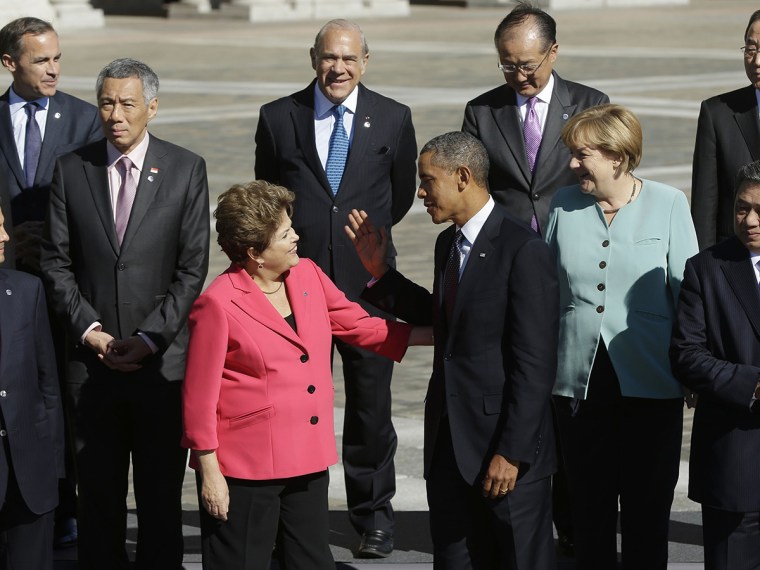At first blush, it's likely the White House's critics will gravitate to
this New York Times piece, headlined, "At Global Economic Gathering, U.S. Primacy Is Seen as Ebbing." But I hope they'll do more than just read the headline.
As world leaders converge here for their semiannual trek to the capital of what is still the world's most powerful economy, concern is rising in many quarters that the United States is retreating from global economic leadership just when it is needed most. "It's almost handing over legitimacy to the rising powers," Arvind Subramanian, the chief economic adviser to the government of India, said of the United States in an interview on Friday.... Other officials attending the meetings this week, speaking on the condition of anonymity, agreed that the role of the United States around the world was at the top of their concerns.
For Republicans and a variety of lazy pundits, one assumes the reaction to such reports is reflexive : "See? President Obama obviously needs to lead more."
But there's a more meaningful takeaway from reports like these, published to coincide with the spring meetings of the International Monetary Fund and World Bank. The Times' piece notes that it was the United States that was largely responsible for building the global economic stage after World War II, it was the United States that's directed the stage for generations, but it's now the United States that's struggling to maintain its primacy.
Washington's retreat is not so much by intent, Mr. Subramanian said, but a result of dysfunction and a lack of resources to project economic power the way it once did. Because of tight budgets and competing financial demands, the United States is less able to maintain its economic power, and because of political infighting, it has been unable to formally share it either.
And this is the part that the political world should pay attention to. For all the assumptions on the right about President Obama retreating from the global stage, that's almost entirely backwards -- Republicans are almost exclusively referring to a willingness to fight and prolong wars when they make the complaint. It's the White House, however, that welcome greater international engagement, but faces an intransigent Congress run by a far-right party.
As the world looks for more investment, American lawmakers ask, "How can we spend less?" As China looks to expand its influence, it's the U.S. Congress that asks, "How can we scale back even more?"
This other
NYT article also stood out.
China's president, Xi Jinping, travels to Pakistan on Monday laden with tens of billions of dollars in infrastructure and energy assistance on a scale the United States has never offered in the past decade of a close relationship, a gesture likely to confirm the decline of American influence in that nation. Mr. Xi, making his first overseas trip this year, and the first by a Chinese leader to Pakistan in nine years, will arrive fortified from the robust reception to the new China-led Asian Infrastructure Investment Bank, and is looking to show that China can make a difference in a friendly, neighboring country troubled by terrorism.
So, China is expanding its outreach in Africa, the Caribbean, and Latin America, further establishing areas of influence in multiple hemispheres.
Republicans -- again, usually in the context of military might -- routinely say that the world is "starving" for American leadership, but the whining is too often superficial. Ask the same GOP officials if they're ready for the United States to lead on the climate crisis, and they'll say no. Ask them if they're ready for the United States to lead on counter-proliferation, and they'll say no. Ask them if they're ready for the United States to lead on international economic development, and they'll say no.
The weekend's piece added, "Even the United States' Export-Import Bank, a lending agency similar to export financing arms in countries around the world, could be killed in June by conservatives in Congress, leaving would-be foreign customers in the cold and many American exporters at a disadvantage to competitors abroad."
The problem is not that American Republicans are disinterested in our role as international leaders; rather, the problem is their interest is purely rhetorical. They want to talk about how important American leadership is in the 21st century, but they seem reluctant to actually exercise that leadership in any kind of meaningful or constructive way.
